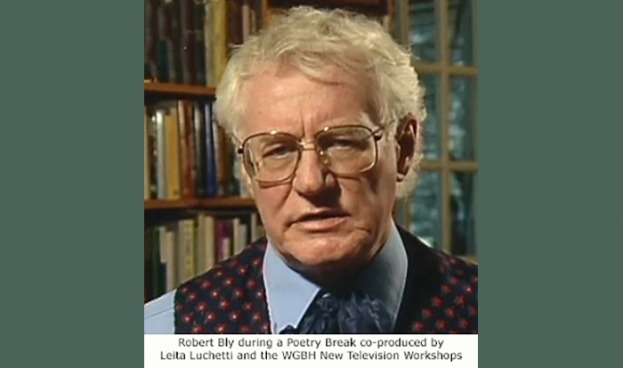Robert Bly, who died November 21, 2021, at the age of 94, had a tremendous impact on our spiritual lives and, we suspect, on the spiritual journeys of many of our website visitors. Here's a profile of his amazing contributions in our Remembering Spiritual Masters Project.
And here are some specific reasons why we honor his life and will miss his presence:
- Bly, a Minnesota poet, author, and translator, felt at home in the beautiful and bountiful world of nature. Through his writings, he took us into the natural world and filled us with awe.
- Bly brought a heightened sense of drama to his poetry recitals. His readings were often accompanied by the music of drums and sitars. He repeated lines to draw out their richness. Whenever possible, and always appropriately, he used humor.
- His 1990 book Iron John: A Book About Men became a bestseller, launching the men's movement, recognizing that many men were uncertain about their identity and life purpose. In the woods, on retreats, and in small groups, they used rituals and staged initiation rites to mark life passages and explore the longings of their souls. The psychologist Robert Moore stated: "When the cultural and intellectual history of our time is written, Robert Bly will be recognized as the catalyst for a sweeping cultural revolution."
- Bly was also an important social critic. In A Society of Siblings (1996) he leveled a stinging critique of the selfishness and amorality of youth culture and suggested that elders spend their retirement years sharing their wisdom with the young.
- Not content to only write about his concerns, whether in poetry or prose, Bly was an activist in antiwar movements from Vietnam through Iraq. He co-founded American Writers Against the Vietnam War and toured the country where his distinctive voice garnered attention from small and large crowds.
- Bly often transported us beyond our narrow concerns and challenged us to tap into our deepest yearnings. Bly introduced us to the Sufi poetry of Rumi (1207-1273) via a cassette tape on which he and Coleman Barks alternated reading Rumi poems. We learned that Bly was the one who encouraged Barks to begin translating Rumi, and, of course, those translations helped make this Sufi mystic the best-selling poet in America for a time.
- Whenever we feel depleted, we also have turned to Bly whose translations of such mystical seers as Kabir, Hafiz, and Mirabai lift our spirits. As a philosopher, Bly presented a mystical vision of the universe where animals, plants, and objects are equals with human beings.
- A poet himself, Bly seemed to revel in the opportunity to introduce us to other poets from Europe, Asia, and the Americas. His 2005 collection The Winged Energy of Delight helped us appreciate the creative verse coming to us from around the world. In a very real sense, he expanded our consciousness and soulfulness. Bly went global and swept us along on his journeys.

 Gratitude to Robert Bly
Gratitude to Robert Bly